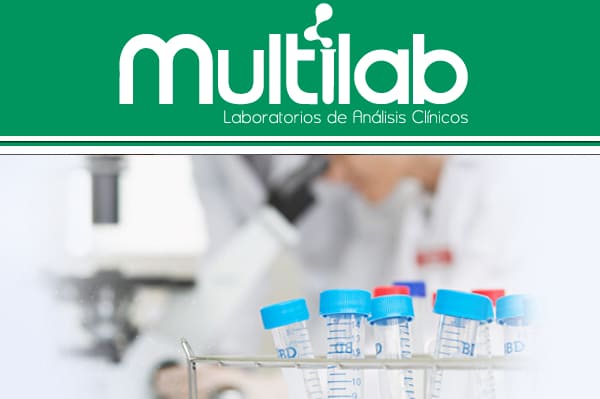
 https://www.multilab.com.pe/examen/1164/sars-cov-pcr
https://www.multilab.com.pe/examen/1164/sars-cov-pcr
We ower more than 1,000 exams. Please enter the name of the exam you are looking for
Ver precio
Incluye IGV. Válido para Lima. El precio seleccionado es para la sede . Los precios pueden variar por sede.
What is the coronavirus (SARS-CoV-2) PCR test (molecular test)?
It is a laboratory test that can identify the virus that causes COVID-19 (coronavirus) in secretions from the upper throat behind the nose (nasopharyngeal exudate) and in the throat behind the mouth (oropharyngeal). It is performed with a swab.
The medical community considers detection of coronavirus by PCR to be the gold standard.
What is the RT-PCR (molecular test) methodology?
It is a laboratory technique commonly used in molecular biology to generate a large number of DNA copies by a process called "amplification". Exponential amplification by reverse transcription PCR is a highly sensitive technique. That is, it can detect a very low RNA copy number, or, in simple terms, it is effective in finding infections.
Can this molecular test detect the new SARS-CoV-2 variant?
Yes, the molecular test has been able to detect the main existing variants as of the time of this update (April 15, 2021).
Does the molecular test identify the SARS-CoV-2 virus variant that caused the infection?
No, the molecular test will indicate whether you are infected with SARS-CoV-2, but it will not identify the variant.
Why is it requested?
To detect if you are currently infected with the virus that causes COVID-19. If you are infected, you will be able to receive medical care and prevent infecting others.
When is it requested?
When you think you might be infected with COVID-19, either because you have symptoms or because you have been in contact with an infected person.
Is there an endorsement from the INS (National Institute of Health) for the performance of this molecular test by MULTILAB?
Yes, the INS, by means of the OFICIO N° 454-2020-DG.CNSP/INS, issued the "Constancia de cumplimiento de Laboratorios Clínicos Múltiples S.A.C. - MULTILAB for molecular detection of SARS-CoV-2 virus".
If I take this molecular test, will I be able to access the result through the State system?
Yes, our laboratory has committed to comply with the entry of the results to the Laboratory Information Management System NETLAB of the INS, so that any patient who takes this test will be able to access the result by entering the official website of the INS, in "covid-19 results query"
How much time should elapse since the infection for the test to detect it?
Experts suggest testing 3 to 5 days after infection may have occurred. Viral RNA is detected before symptoms appear, peaking between the fifth and seventh day after symptom onset and usually becoming negative within 15-30 days.
What does the test result mean?
What type of sample is required?
Laboratory personnel should obtain two samples: one from the nose and one from the mouth. The first one will be from the upper respiratory tract, by introducing a first swab through the nasal cavity performing rotary movements making pressure on the walls of the nostril. We will introduce a second swab through the mouth obtaining the sample from the posterior pharynx. The laboratory personnel will place swabs in a viral transport medium.
How accurate is the test?
The molecular test is considered highly accurate. In the case of PCR with a properly obtained sample, the sensitivity of the test is greater than 99%. Sensitivity describes how well a test can detect disease in infected persons.
The specificity of the test is close to 100%. Specificity describes how well a test can identify that the disease does not exist in uninfected persons. In other words, a positive test result means that it is highly likely that the patient is infected.
I do not have any symptoms, is it necessary to test for Coronavirus by PCR?
It is recommended to avoid spreading the infection to your family, friends and colleagues. Research in the journal Science showed that two out of three infections of the new coronavirus have been caused by people who had not been diagnosed with the virus or had no symptoms.
Is the test painful to perform?
Obtaining the sample should not be painful, but it is uncomfortable. Each of the two samples takes less than 1 minute.
Are my results confidential?
Yes, Multilab will make the epidemiological report indicated in the law to the National Institute of Health. Multilab and the National Institute of Health keep your patient's test results confidential.
Molecular testing for travel
If you need a molecular test to travel, we offer it to you, have a safe trip.
You should know that it is not required to submit a molecular test to leave the country, however if the country of your destination requires this test, you must do it to enter.
We recommend that you review the entry restrictions that have been established in your destination country due to the expansion of COVID-19. You should consider that this information may vary, so we recommend that you constantly check the official sites of the destination country before your trip. If you have connecting flights, you should also confirm which requirements you must meet to board and arrive at your final destination.
Technical information and test limitations:
RT-PCR, tiempo real
Hisopado
Para la realización del presente examen es necesario que el paciente firme el siguiente consetimiento informado:
El paciente lo puede llevar a la sede impreso y firmado. De lo contrario será impreso en recepción durante su visita.
¿Was the site helpful?
NO YES